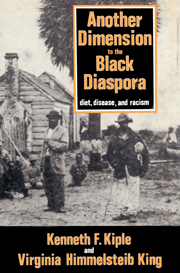Book contents
- Frontmatter
- Contents
- Preface
- Acknowledgments
- Part I African beginnings
- Part II Immunities: epidemiology and the slave trade
- Introduction to Part II
- 2 Yellow fever in black and white
- 3 Bad air in a new world
- 4 Tropical killers, race, and the peculiar institution
- Part III Susceptibilitie
- Part IV Antebellum medicine
- Part V Sequelae and legacy
- Notes
- Bibliographic essay
- Index
4 - Tropical killers, race, and the peculiar institution
Published online by Cambridge University Press: 26 March 2010
- Frontmatter
- Contents
- Preface
- Acknowledgments
- Part I African beginnings
- Part II Immunities: epidemiology and the slave trade
- Introduction to Part II
- 2 Yellow fever in black and white
- 3 Bad air in a new world
- 4 Tropical killers, race, and the peculiar institution
- Part III Susceptibilitie
- Part IV Antebellum medicine
- Part V Sequelae and legacy
- Notes
- Bibliographic essay
- Index
Summary
The misunderstanding of the medical men came ultimately to be enshrined at the core of scientific racism.
Philip Curtin (1964)European physicians on the coast attempted early to understand why their compatriots failed so miserably to survive those “fevers” to which the black seemed impervious. Unfortunately, their devotion to epidemiologic thought, aged some one-and-a-half millennia, yielded the explanation that the West African sun unbalanced humors in European bodies. Worse, their efforts to correct humoral imbalances in feverstricken victims by draining the body of blood and bile must have contributed heavily to the mounting European death toll. Doubtless many would have survived these dehydrating illnesses had not physicians joined pathogens in depleting body fluids.
Yet not all medical knowledge derived from the ancients was without value. In his classic scrutiny of Airs, Waters, and Places, Hippocrates had speculated that “bad air” might carry disease. Although established in antiquity, this notion had never firmly embedded itself in European thought; continental physicians preferred to rely on Galen. After yellow fever and malaria managed their respective migrations to the Americas and embattled physicians proved helpless against the pair on both sides of the Atlantic, however, the hypothesis began to receive some serious attention. Galen's long reign was at last threatened by changes in medical thought quite literally in the air, and a new empiricism began to permeate the medical profession.
The great English physician Thomas Sydenham (1624–89) was an important figure in this movement urging colleagues to abandon the theoretic for empiric observation, while the migration of Europeans to the Americas under the stimulus of colonization and tropical wars provided a new generation of physicians with bountiful opportunities to observe the mayhem wrought by these diseases firsthand.
- Type
- Chapter
- Information
- Another Dimension to the Black DiasporaDiet, Disease and Racism, pp. 58 - 68Publisher: Cambridge University PressPrint publication year: 1981



